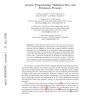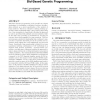2045 search results - page 98 / 409 » Learning programming with Erlang |
125
click to vote
JASIS
2000
15 years 2 months ago
2000
s In data mining, we emphasize the need for learning from huge, incomplete and imperfect data sets (Fayyad et al. 1996, Frawley et al. 1991, Piatetsky-Shapiro and Frawley, 1991). T...
139
click to vote
CEC
2008
IEEE
15 years 4 months ago
2008
IEEE
Abstract-- We investigate the usefulness of a subtree deactivation control mechanism which is open to evolutionary learning. It is hypothesised that this representation confers an ...
147
click to vote
CORR
2006
Springer
15 years 2 months ago
2006
Springer
Fitness functions based on test cases are very common in Genetic Programming (GP). This process can be assimilated to a learning task, with the inference of models from a limited n...
123
click to vote
ML
2006
ACM
15 years 2 months ago
2006
ACM
The application of Inductive Logic Programming to scientific datasets has been highly successful. Such applications have led to breakthroughs in the domain of interest and have dri...
118
click to vote
GECCO
2008
Springer
15 years 3 months ago
2008
Springer
Bid-based Genetic Programming (GP) provides an elegant mechanism for facilitating cooperative problem decomposition without an a priori specification of the number of team member...


